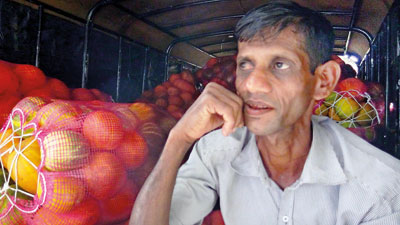News
Farmers aghast at drop in prices

Face of despair: A farmer contemplates his fate. Pic by Kanchana Kumara Ariyadasa
A glut of seasonal vegetables at the Dambulla Economic Centre (DEC) has brought down the prices of tomatoes and chillies, placing farmers in a dilemma.
Farmers claimed the price of chillies, more than Rs.1000 a kilogram last week, had dropped to a meager Rs.120-140 and tomatoes to Rs.8 a kilo and that they might have to abandon farming.
They lamented they were even unable to get back the money invested for cultivation. One farmer said the number of buyers had dropped dramatically.
“All vegetables are selling below Rs. 20 a kilogram and we cannot even recoup our costs,” a farmer said.
They claimed that the rains were exacerbating the situation by shortening the shelf-life of the produce.
One farmer said that most of the vegetables were thrown away as they are not fit for consumption.
Other vegetables that have come down in price at the DEC are cabbages, damballa, kekiri (cooking melon), long beans and brinjals.
All-Ceylon Peasants Union General Secretary Namal Karunaratne said that the government had failed to design a system where vegetable shelf-life could be prolonged and that farmers were suffering through lack of a proper storage system for their produce. “We do not have proper cooling system to extend vegetable shelf-life at least by one or two weeks,” he said.
He said there should be associated industries that make use of the excess fruits and vegetables and preserve them for future use.
“Here, we have to finish consumption within a week, which gives minimum leverage for farmers in negotiating prices,” Mr. Karunaratne said.
When farmers paid for transport, labour and miscellaneous transport costs they made hardly any profit. “Even the prices of seeds and fertiliser has risen sharply,” he said.
The glut is due to the shift in the seasonal monsoonal rains, says the Hector Kobbekaduwa Agrarian Research Training Institute (HKARTI) the body responsible for disseminating knowledge for sustainable agrarian development.
The usual inter-monsoonal rains in October did not come on time and as a result the farmers had gone ahead and cultivated tomatoes and chillies, and now they were left with a glut of produce, the institute’s Head of Marketing, Food Policy and Agribusiness, Duminda Priyadharshana said
Tomatoes and chillies are a 45-day crop and the farmers have got a good season this time, he said.
Mr. Priyadharshana said the drop in prices had also been caused by the closure of the DEC for two consecutive days (Sunday and Poya Day) which had resulted in a heavy buildup of produce. He said the phenomenon was temporary and prices should pick up this week.
The Meteorological Department confirmed the inter-monsoonal rains came late. Director Lal Chandrapal said the rains due in October did not eventuate. “It has started late and it is raining now,” he said.
He said that the El Nino effect that hit Sri Lanka last year had phased out and would pose no further adverse effects. “The temperature in the Pacific region is slightly below average but will not affect us adversely,” he said.
Additional reporting: Dambulla Correspoondent Kanchana Kumara Ariyadasa

